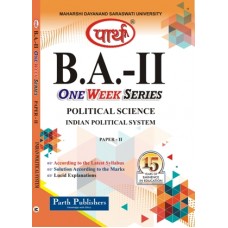- BA
- BA One Week Series(Rajasthan) HINDI Medium
- BA ONE WEEK SERIES (JNVU) HINDI MEDIUM
- BA ONE WEEK SERIES (JNVU) ENGLISH MEDIUM
- BA One Week Series(Rajasthan, Brij, Matsya, shekhawati) English Medium
- BA One Week Series(Shekhawati) HINDI Medium
- BA One Week Series(Shekhawati) English Medium
- BA ONE WEEK SERIES (UNIVERSITY OF KOTA) ENGLISH
- BA ONE WEEK SERIES (MDS) ENGLISH MEDIUM
- BA ONE WEEK SERIES (MGSU) ENGLISH MEDIUM
- BA UNSOLVED PAPER (RU)
- BA TEXT BOOKS
BA-PART-2 Political Science - Indian Political System (Q&A) One Week Series- MDS University
BA-PART-2 Political Science - Indian Political System (Q&A) One Week Series- MDS University
Rs. 90.00 Rs. 180.00
Inclusive Tax: Rs. 90.00
Inclusive Tax: Rs. 90.00
BA-PART-2 Political Science - Indian Political System (Q&A) One Week Series- MDS University
Indian Political System
This One Week Series is Written in English Language in Question Answer Series According to syllabus of Maharishi Dayanand University.
POLITICAL SCIENCE
Indian Political System
Note: Each theory paper is divided into three independent units. The question paper will be divided into three parts: Part.A, Part.B. Part.C., Part-A (20 marks) is compulsory and contains 10 questions at least three questions from each unit. Each question is of two marks (20 words) Part-B (20 Marks) is compulsory and will contain five questions; at least one from each unit. Candidate is required to attempt all five questions. Each question is of four marks150 words. Part-C 60 Marks contains six questions: two from each unit Candidate is required to attempt three questions one from each Unit. Each question is of twenty marks (400 words).
UNIT-I
Historical Background of the Constitution: Main Currents of National Movement- Moderates, Extremists.
Gandhian, Revolutionary
Constitutional Development: Govt. of India Act 1909, Govt. of India Act 1919 with special reference to Diarchy, Govt. of India Act, 1935 with special reference to Provincial Autonomy.
The Constituent Assembly-Origin, Organization and functioning. The main characteristics of the Indian Constitution; The Constitution Amendment Process. The ideological elements - Preamble, Fundamental Rights, Directive Principles of State Fundamental Duties and Secularism.
UNIT-II
The Union and State Government
President - Election, Position, Powers and Functions, Council of Ministers and Prime Minister - Position and role. Parliament - Organization Power and working of Lok Sabha and Rajya Sabha. Modes of Relationship between the two houses.
The Supreme Court - Organization and jurisdiction, Judicial Review, Judicial Activitism, Conflict of supremacy between the parliament and supreme court.
The State Government: Governor - Position and role, the Council of Ministers and Chief Minister, the state legislature.
The Federal System - The need and nature of the federal system, center-state relations, areas of tension and demand for autonomy.
UNIT-III
The Party System, Political Parties - National and Regional. The Election Commission, Electoral Reforms and Voting Behavior, Voting Behavior of 2014 Lok Sabhas Election.
Determinants of Political System:
(a) Economic: Class and Poverty
(b) Sociological: Caste, Religion, Region, Language, Gender and terrorism
(C) Political: Political parties and pressure groups.
Powered By PAWAN SHARMA
Online Book Mart © 2024






